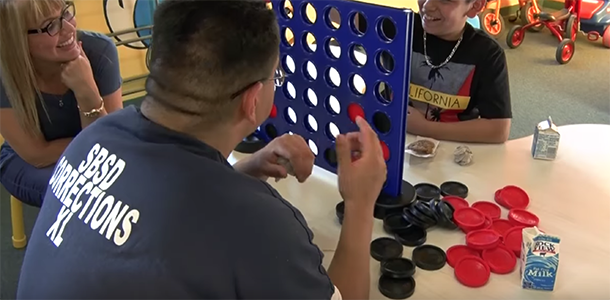
(Image from San Bernardino County Sheriff’s Department video)
The highlight of John’s week is the 90 minutes he spends with his children.* He and his three sons play basketball, soccer and the youngest son likes coloring with his dad. During that hour and a half and the rest of the week, John is also an inmate at the Glen Helen Rehabilitation Center in San Bernardino County.
Through the facility's Teaching and Loving Kids (TALK) program, John is able to have that time with his children and learn what’s going on at home and at school and how they are doing overall.
“A lot of studies have shown that parent-child contact visits also reduce the recidivism rate for the parent, which minimizes the re-traumatization for the children,” said Chris Martin, inmate programs coordinator for the San Bernardino County Sheriff.
The program is one of the many offered through the Inmate Services Department of the San Bernardino County Sheriff’s Department. TALK allows incarcerated mothers and fathers to have 90-minute, supervised visits with their children once a week at two of the county’s facilities.
During the visits, a clinical facilitator and interns are present as observers, not participants, allowing the parents and children to interact. After each visit, the parents and interns talk about the visit and address any concerns. At the Glen Helen facility, the visits take place in an area with a playground and a playroom that looks similar to a school setting. This creates a comfortable atmosphere for both the parents and the children.
Martin added that allowing parents who are incarcerated to have real contact with their children is important. “It helps remove the negative perceptions that the children might have of the police and the legal system. It helps them with their ability to cope with stress and trauma, let’s them know that mom or dad are OK. It helps with their development.”
To enter the TALK program, inmates must complete a 12-hour Trauma Recovery and Family Relations class either voluntarily or through a court order. The classes are taught through a partnership with California State University San Bernardino with interns from CSUSB and Riverside’s California Baptist University. The class helps inmates learn about their own trauma and how it affects their lives and families.
“The class changed my attitude,” said John, who is in jail on drug charges. “I understand my sons better. I care more for my sons. I learned how to be more attentive and pay more attention to them, to listen to them, which I didn’t do before.”
This is not the first time he’s been incarcerated, but it is the hardest because of what he learned in the trauma class. “I missed them before, but not in the same way,” said John. “I’ve learned to value my family and it’s changed.”
“That listening piece is one of the key elements we teach,” explained Christopher Vallejo, who leads the trauma classes. “It’s not just hearing the words they’re saying. It’s the active listening, engaging with them and their emotional content.”
Beth Raper is a social worker with the San Bernardino County Sheriff’s Department and has been with the TALK program for nine years. She has witnessed how the program has evolved since the partnership with CSUSB began. “I feel it’s better because, if you don’t meet the parents where they’re at, then nothing is going to change. And so trying to forget that the parent is in jail is not appropriate. They are in jail and that needs to be addressed and how that, as being a mom or a dad, affects their kids.”
Sometimes it takes work to create or repair an incarcerated parent-child relationship. Raper recalled one child who didn’t know for a time that her dad was in jail. “She was angry. She was upset. She didn’t not talk to her dad, but when she came in, you could tell with her body language that she was upset with a ‘Why didn’t you tell me’ kind of thing.” A social worker was there to help the family and work with the dad to understand his daughter’s anger.
And understanding where each person is emotionally makes a big difference. “Now they like to sit at the picnic table and they just talk about everything,” said Raper. “And he listens to her. He knows how to listen now, where before he didn’t. And he’s one of those inmates who, when the new dads come in, he mentors them and tells them how the program works.”
The TALK program also has events that help normalize relationships between the parents and children. It hosts a Halloween party, where the children trick-or-treat in costume, and a Christmas party complete with a visit from Santa.
The Parent and Child Connection is another program that connects incarcerated parents to their children. Parents record their voice reading a children’s book, then the book and the recording are sent to the child, in order to give them comfort.
And that’s the goal of TALK and the other programs, according to Martin, “It helps normalize the interaction between the parent and the child.” Better relationships with their children will hopefully result in better outcomes and lower recidivism rates.
“I’m grateful to be in the program,” said John. “It’s a beautiful thing to see your kids and give them hugs.”
*Editor's Note: John's name was changed to protect the privacy of the individual.

